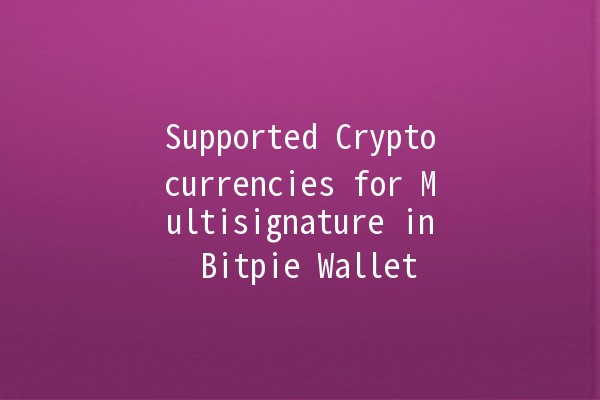




In the rapidly evolving cryptocurrency landscape, securing assets is more crucial than ever. One effective way to enhance security is through the use of multisignature wallets. Bitpie Wallet, a popular cryptocurrency wallet, supports several cryptocurrencies with multisignature capabilities. This article delves into the supported cryptocurrencies for multisignature within Bitpie Wallet, provides productivityboosting tips, and offers valuable insights into maximizing your crypto security.
Multisignature (multisig) wallets require multiple private keys to authorize a transaction. This setup minimizes risks associated with singlepoint failures and enhances the overall security of cryptocurrency holdings. For instance, a wallet may require signatures from two out of three keys to complete a transaction. This feature is particularly beneficial for organizations or individuals managing significant cryptocurrency assets.

Bitpie Wallet supports a variety of cryptocurrencies for multisignature transactions. Below are some of the notable ones:
Managing cryptocurrencies can be a complex task, but there are various strategies you can employ to enhance your productivity. Here are five practical tips:
Explanation: Having a clear organization system for your private keys is essential for multisignature wallets.
Example: Consider using a secure password manager to store your private keys. This way, you can easily retrieve them when needed without compromising security.
Explanation: Staying informed about wallet activity can ensure swift action in case of unauthorized attempts or transactions.
Example: Enable transaction alerts through your wallet's settings. This will notify you anytime a transaction occurs, allowing you to quickly verify its legitimacy.
Explanation: If you’re using multisig with multiple signers, defining roles can streamline the approval process.
Example: For a business, assign specific roles to team members based on their authority levels. For instance, the finance manager may have a higher signing authority than other team members.
Explanation: Cyber threats evolve constantly, so it’s essential to stay updated with the latest security measures.
Example: Conduct quarterly reviews of your security practices and update your multisignature settings. Ensure that all key holders are aware of current security threats and best practices.
Explanation: Storing keys on hardware wallets adds another layer of security against online threats.
Example: Use hardware wallets for storing private keys and set up multisignature transactions with Bitpie to authorize payments. This combination can significantly enhance security.
Answer: A singlesignature wallet requires one private key to authorize a transaction, making it straightforward but less secure. In contrast, a multisignature wallet requires multiple keys, enhancing security and enabling shared control over digital assets. This makes multisig wallets more suitable for businesses and organizations with multiple stakeholders.
Answer: Setting up a multisignature wallet in Bitpie involves selecting the multisig option in the wallet settings, choosing the number of signatures required for transactions, and adding the appropriate public keys for each signatory. This process ensures that funds can only be accessed with the consensus of several authorized users.
Answer: While Bitpie Wallet supports various configurations for multisignature setups, the number of keys may depend on the specific cryptocurrencies involved. Typically, users can configure wallets to require two or more signatures but should refer to the official documentation for precise limits on each cryptocurrency.
Answer: Generally speaking, multisignature wallets are set up for individual cryptocurrencies. You might create separate multisignature wallets for Bitcoin, Ethereum, and other assets, tailored to their respective transaction requirements. However, Bitpie Wallet may allow for a diverse range of supports, and users should consult with the wallet’s resources to maximize compatibility.
Answer: Yes, multisignature wallets can be beneficial for personal use, especially if you hold a significant amount of cryptocurrency. For individuals, it offers an additional layer of security against unauthorized access. You might also use it alongside trusted family members or partners to manage joint holdings securely.
Answer: The impact of losing a key in a multisignature setup depends on the configuration of the wallet. In a 2of3 multisig wallet, for instance, if one key is lost, the asset can still be accessed by the remaining two keys. However, if the lost key is compromised and used for a transaction without proper authorization, the situation may risk the funds' security. Always have a recovery plan in place, like securely storing your keys in different locations.
In the world of digital currencies, the security of your assets is paramount. By understanding the supported cryptocurrencies for multisignature in Bitpie Wallet and implementing effective management strategies, you can significantly enhance your security and efficiency in handling cryptocurrencies.